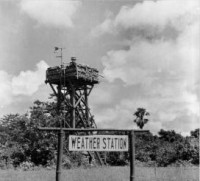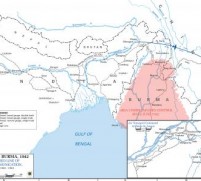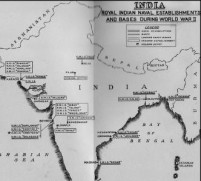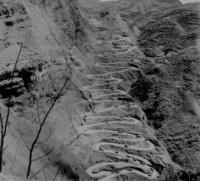THE TAKORADI ROUTE - THE JOURNEY TO EGYPT C.B.I.
6)ON THE BEACH IN LIBERIA
By Bob Dethlefsen
Of course the first question was where in Africa are we and how safe are we? It didn't take long to find out. Within a very few minutes a couple of men came running towards us and, since they had a smattering of English, we learned that we were at the southern tip of Liberia, approximately 140 miles south of our intended destination. Just a few more degrees to the right and we surely would have ended up well short of land.
Shortly thereafter, an English missionary arrived on the scene, and assured us that even though we were many miles from nowhere, we were perfectly safe. Since this was on the normal route between Roberts Field and Accra, and since the radioman did manage to get the word to someone, he really didn't know who, that we were about to go down on the beach, we were spotted from the air that afternoon.
Although the traffic could not be considered heavy, each aircraft that circled to have a look sent the word deeper into the bush and, by sundown, there was a solid mass of jabbering humanity surrounding us. As the darkness took over, the crowd seemed to melt away and the "mumbo-mumbo-mumbo" slowly subsided. But, at the crack of dawn, there they were, back again in even greater numbers.
There were four or five men who had served in the Merchant Marine and that spoke English reasonably well so, we "hired" them as guards. This was more to keep the crowd back than anything else. Because it rained for five minutes every hour and because a B-25 was not designed for comfort, finding a place to relax or sleep was almost impossible. To top it off, we had ejected the top hatch over the pilot's compartment just before landing, and then couldn't find it, a hundred trips up and down the each, notwithstanding.
There was one spirits lifting incident that must be mentioned. The pilot of one of the first Pan-Am planes to give us the once over, wrapped a message around a can of corned-beef and dropped in right in our lap. His message told of the US victory at Wake Island he offered congratulations for our successful beach landing.
One of the aircraft that circled the first day was a Pan-American Grumman "Duck" that was used primarily to transfer passengers from the their Clipper landing site to Roberts Field where they continued their journey via DC-3 or C-47. A message was dropped stating that there was a river not far from us and that they would return the next afternoon to pick up the two "worst off" or, the pilot and navigator.
The Duck was back on schedule the next day, brought some halfway decent food, said he would be back when his schedule would permit, and departed with pilot and navigator. He did come back again the next day and left with the bombardier and engineer. Meanwhile for lack of something better to do and anticipating the day that we might try getting the airplane off the beach, I "hired" some more of the locals to lift up the nose and turn it around.
This was not an easy task to be done on a beach with a distinct language problem to boot but somehow we managed to get it done. Although I did have plenty of US money, it wasn't much good to these people and how to pay them was going to be a problem.
As clamor for payment got louder, someone, perhaps the missionary suggested sending some dollars to someplace where it could be converted to local coinage. This was done by ocean-going canoe. It took two days and they brought back what was the equivalent of $40 in pennies! Now however, there was a real problem. How much is owed to whom? So the Paramount Chief of the village set up a table at which he, I, and the missionary sat.
The locals didn't want the missionary to participate because they were afraid they wouldn't be able to cheat as much--he understood their language. Each person who had a claim presented himself and after describing what he had done, the Chief decided what should be proper payment.
This took quite some time and as the line didn't seem to get any shorter, I began to worry that the box of coins would empty too soon. However, this was not the time for our luck to give out, and sure enough the last coin went to the last man in line. The Chief was more than happy to accept US $3 as was a fellow I had used as an interpreter.
The Duck did not show up on the 4th day so it was not until day 5 that the radioman and I were finally restored to something approaching the good life. This time they brought down a repair crew with tools and spare parts, tents, food and whatever else to make it a real picnic at the beach. When I arrived at Roberts Field the big question was, can the aircraft be made to fly again. With my limited years and experience there was little I could offer.
But with the regular rain and the proximity of a salt water ocean, I felt that I could see the corrosion going on before my eyes, and had strong doubts. In any case, new props were hung, the nose wheel braced (could not be retracted so it would be a gear down flight), canvas over the greenhouse and with a bit of fuel loaded one month later it was ready to go. The pilot and I were returned to the scene to give it a go.
Small trees were laid in a row and the tires were slightly flattened to help us get started. We started to roll and after a few zigs and a few zags we appeared to be on our way. But no, about that time the pilot's better judgment told him to abort, resulting in another nose wheel collapse, two more bent props and the greenhouse shoved back another foot.
On my walk back to the river, I never looked back and never saw 513 again. We then, along with the navigator, were sent on to Accra, Gold Coast, to await further orders. The remainder of the crew had long since moved on looking for the action. There was really nothing for us to do while we had been waiting at Roberts but with the help of the local Firestone Rubber Plantation Supervisor, we did some sight-seeing in and around Monrovia, the capitol of the country.
Almost daily one or more airplanes of every variety would come through on their way east, and we would be brought up to date on the news. On the same day that we had left Natal, three other B-25s also departed, one of which also became disoriented (lost) and managed to find an airfield north of Liberia, and landed in Vichy French territory. That crew was interned for almost a year.
Some time later, a year or more, I ran into someone who claimed to have first hand knowledge of the final outcome of our disaster. It had taken almost six months but the plane had again been repaired, this time properly. Then, it took more time to find a couple of pilots willing to give it a second go. They did get off the ground and were half way to Roberts when the engines gave out. They went down in the jungle and although there were some serious injuries both men survived.
If there was any salvage of parts I believe it was done by local Liberians. The question now was, do we continue our journey east or, return to the US for another airplane. While the folks that make that kind of decision debated we were sent on to Accra, Gold Coast to await further orders.



